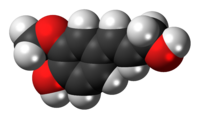松柏醇
化合物
松柏醇是化學式 HO(CH3O)C6H3CH=CHCH2OH的有機化合物。它是無色或白色的固體,是由苯丙素類生物合成產生的單木纖維素。它和相關芳香化合物會共聚成木質素或木脂素。[1][2][3]松柏苷是松柏醇的葡萄糖苷。松柏醇是丁香油酚、芪類化合物和香豆素生物合成的中間體。安息香中含有大量的松柏醇和其酯。不管是裸子植物還是被子植物中都含有松柏醇。另外兩個木質素的單體芥子醇和對羥基肉桂醇則存在於被子植物中。
| 松柏醇 | |
|---|---|

| |

| |
| IUPAC名 4-[(1E)-3-Hydroxyprop-1-en-1-yl]-2-methoxyphenol | |
| 英文名 | Coniferyl alcohol |
| 別名 | 4-hydroxy-3-methoxycinnamyl alcohol Coniferol |
| 識別 | |
| CAS號 | 32811-40-8 |
| PubChem | 1549095 |
| ChemSpider | 1266063 |
| SMILES |
|
| InChI |
|
| InChIKey | JMFRWRFFLBVWSI-NSCUHMNNBF |
| Beilstein | 2048963 |
| ChEBI | 17745 |
| KEGG | C00590 |
| 性質 | |
| 化學式 | C10H12O3 |
| 摩爾質量 | 180.2 g·mol−1 |
| 熔點 | 74 °C(347 K) |
| 危險性 | |
GHS危險性符號
| |
| GHS提示詞 | Warning |
| H-術語 | H315, H319, H335 |
| P-術語 | P261, P264, P271, P280, P302+352, P304+340, P305+351+338, P312, P321, P332+313, P337+313, P362, P403+233, P405 |
| 若非註明,所有數據均出自標準狀態(25 ℃,100 kPa)下。 | |
合成
編輯人們在Forsythia intermedia中發現可以用松柏醇選擇性合成(+)-松脂酚的指示蛋白。[4]最近發現另一個存在於擬南芥的指示蛋白,它可引導(−)-松脂酚的對映選擇性合成。[5]
參考資料
編輯- ^ Iiyama, Kenji; Lam, Thi Bach-Tuyet; Stone, Bruce A. Covalent Cross-Links in the Cell Wall. Plant Physiology. 1994, 104 (2): 315–320. PMC 159201 . PMID 12232082. doi:10.1104/pp.104.2.315.
- ^ Wout Boerjan, John Ralph, Marie Baucher "Lignin Biosynthesis" Annu. Rev. Plant Biol. 2003, vol. 54, pp. 519–46. doi:10.1146/annurev.arplant.54.031902.134938
- ^ 3.0 3.1 Li, Laigeng; Cheng, Xiao Fei; Leshkevich, Jacqueline; Umezawa, Toshiaki; Harding, Scott A.; Chiang, Vincent L. The Last Step of Syringyl Monolignol Biosynthesis in Angiosperms is Regulated by a Novel Gene Encoding Sinapyl Alcohol Dehydrogenase. The Plant Cell. 2001, 13 (7): 1567–1586. PMC 139549 . PMID 11449052. doi:10.1105/tpc.010111.
- ^ Davin, L. B.; Wang, H. B.; Crowell, A. L.; et al. Stereoselective bimolecular phenoxy radical coupling by an auxiliary (dirigent) protein without an active center. Science. 1997, 275 (5298): 362–366. PMID 8994027. S2CID 41957412. doi:10.1126/science.275.5298.362.
- ^ Pickel, B.; Constantin, M.-A.; Pfannsteil, J.; Conrad, J.; Beifuss, U.; Schaffer, A. An Enantiocomplementary Dirigent Protein for the Enantioselective Laccase-Catalyzed Oxidative Coupling of Phenols. Angewandte Chemie. March 2007, 53 (4): 273–284. S2CID 195313754. doi:10.1007/s10086-007-0892-x.